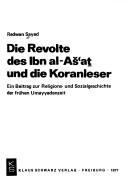| Listing 1 - 10 of 34 | << page >> |
Sort by
|

ISBN: 3879970580 Year: 1977 Publisher: Freiburg i. Br. Schwarz
Abstract | Keywords | Export | Availability | Bookmark
 Loading...
Loading...Choose an application
- Reference Manager
- EndNote
- RefWorks (Direct export to RefWorks)
Ibn al-Ashʻath, ʻAbd al-Raḥmān ibn Muḥammad, --- Iraq --- Islamic Empire --- History
Book
ISBN: 9783447110044 344711004X Year: 2018 Publisher: Wiesbaden : Harrassowitz Verlag,
Abstract | Keywords | Export | Availability | Bookmark
 Loading...
Loading...Choose an application
- Reference Manager
- EndNote
- RefWorks (Direct export to RefWorks)
Arabic language --- Grammar --- Ibn al-Anbārī, ʻAbd al-Raḥmān ibn Muḥammad,
Book
ISBN: 9771801554 9789771801559 Year: 1999 Publisher: [al-Qāhirah] : Dār al-Kutub wa-al-Wathāʼiq al-Qawmīyah, Markaz Taḥqīq al-Turāth,
Abstract | Keywords | Export | Availability | Bookmark
 Loading...
Loading...Choose an application
- Reference Manager
- EndNote
- RefWorks (Direct export to RefWorks)
Book
Abstract | Keywords | Export | Availability | Bookmark
 Loading...
Loading...Choose an application
- Reference Manager
- EndNote
- RefWorks (Direct export to RefWorks)
Islamic Ethics and the Trusteeship Paradigm explores the emerging ethical theory of the trusteeship paradigm as developed by the Moroccan philosopher Taha Abderrahmane (b. 1944). The volume, with contributions in English and Arabic, examines the development of this modern Islamic theory of ethics and how it permeates various disciplines: philosophy, theology, legal theory, moral theory, sociology and anthropology, communication, environment and biomedical ethics. The trusteeship paradigm aims to make ethics the compass of human thinking and action in order to overcome the predicaments humanity faces and realize a more just and balanced world. This makes of it one of the principal and profound ethical theories in Islamic scholarship that engages both classical and modern thought.
Philosophy. --- Mental philosophy --- Humanities --- Ethics & moral philosophy --- ʻAbd al-Raḥmān, Ṭāhā. --- Abderrahmane, Taha --- Ṭāhā ʻAbd al-Raḥmān --- طه عبد الرحمن --- عبد الرحمن، طه --- عبدالرحمن، طه

ISBN: 0863722334 Year: 1998 Publisher: Reading Ithaca Press
Abstract | Keywords | Export | Availability | Bookmark
 Loading...
Loading...Choose an application
- Reference Manager
- EndNote
- RefWorks (Direct export to RefWorks)
Nationalism --- Statesmen --- ʻAzzām, ʻAbd al-Raḥmān. --- عزام، عبد الرحمن --- Azzam, Abdul Rahman Hassan --- Azzam, Abdel Rahman
Book
ISBN: 9004438351 900443836X Year: 2020 Publisher: Leiden, The Netherlands : Brill,
Abstract | Keywords | Export | Availability | Bookmark
 Loading...
Loading...Choose an application
- Reference Manager
- EndNote
- RefWorks (Direct export to RefWorks)
Islamic Ethics and the Trusteeship Paradigm explores the emerging ethical theory of the trusteeship paradigm as developed by the Moroccan philosopher Taha Abderrahmane (b. 1944). The volume, with contributions in English and Arabic, examines the development of this modern Islamic theory of ethics and how it permeates various disciplines: philosophy, theology, legal theory, moral theory, sociology and anthropology, communication, environment and biomedical ethics. The trusteeship paradigm aims to make ethics the compass of human thinking and action in order to overcome the predicaments humanity faces and realize a more just and balanced world. This makes of it one of the principal and profound ethical theories in Islamic scholarship that engages both classical and modern thought.
Philosophy. --- ʻAbd al-Raḥmān, Ṭāhā. --- Ethics & moral philosophy --- Islamic ethics. --- Philosophy, Arab --- Religion and ethics.
Book
ISBN: 9004295399 Year: 2016 Publisher: Leiden, Netherlands : Brill,
Abstract | Keywords | Export | Availability | Bookmark
 Loading...
Loading...Choose an application
- Reference Manager
- EndNote
- RefWorks (Direct export to RefWorks)
A Qurʾān Commentary by Ibn Barrajān of Seville (d. 536/1141) is a critical Arabic text edition of a medieval Muslim Qurʾān commentary entitled, Īḍāḥ al-ḥikma bi-aḥkām al-ʿibra ( Wisdom Deciphered, the Unseen Discovered ). The annotated Arabic text is accompanied by an analytical introduction and an extensive subject index. This Qurʾān commentary is Ibn Barrajān’s last and most esoteric work, and as such offers the most explicit articulation of his mystical and philosophical doctrines. It synthesizes his teachings, drawn from a wide array of Islamic disciplines, and provides a link between early Sufism and Muslim mysticism in medieval Spain (Andalusia). The Īḍāḥ moreover is the earliest known work of its kind to make extensive use of Arabic Biblical material as proof texts for Qurʾānic doctrines.
Book
ISBN: 9004295380 9789004295384 9789004295391 9004295399 Year: 2015 Publisher: Leiden Boston
Abstract | Keywords | Export | Availability | Bookmark
 Loading...
Loading...Choose an application
- Reference Manager
- EndNote
- RefWorks (Direct export to RefWorks)
A Qurʾān Commentary by Ibn Barrajān of Seville (d. 536/1141) is a critical Arabic text edition of a medieval Muslim Qurʾān commentary entitled, Īḍāḥ al-ḥikma bi-aḥkām al-ʿibra ( Wisdom Deciphered, the Unseen Discovered ). The annotated Arabic text is accompanied by an analytical introduction and an extensive subject index. This Qurʾān commentary is Ibn Barrajān’s last and most esoteric work, and as such offers the most explicit articulation of his mystical and philosophical doctrines. It synthesizes his teachings, drawn from a wide array of Islamic disciplines, and provides a link between early Sufism and Muslim mysticism in medieval Spain (Andalusia). The Īḍāḥ moreover is the earliest known work of its kind to make extensive use of Arabic Biblical material as proof texts for Qurʾānic doctrines.
Book
ISBN: 9788447709595 Year: 2007 Publisher: Barcelona PPU
Abstract | Keywords | Export | Availability | Bookmark
 Loading...
Loading...Choose an application
- Reference Manager
- EndNote
- RefWorks (Direct export to RefWorks)
Medicine, Arab --- History --- Translations into Hebrew --- Ibn Wāfid, ʻAbd al-Raḥmān ibn Muḥammad, --- Translations into Hebrew.
Book
Year: 2020 Publisher: مركز الكتاب الاكاديمي
Abstract | Keywords | Export | Availability | Bookmark
 Loading...
Loading...Choose an application
- Reference Manager
- EndNote
- RefWorks (Direct export to RefWorks)
Arabic language --- Grammar --- Theory, etc. --- Versification. --- Rhetoric. --- Jurjānī, ʻAbd al-Qāhir ibn ʻAbd al-Raḥmān,
| Listing 1 - 10 of 34 | << page >> |
Sort by
|

 Search
Search Feedback
Feedback About UniCat
About UniCat  Help
Help News
News